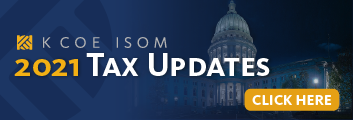An internal memo outlining the Senate’s $3.5 trillion budget framework plan was released by Senate Democrats today. The “fully-paid-for” plan includes specific spending targets as well as a $1 billion reduction in the deficit. KCoe’s tax advisors have broken down the highlights for impacts to taxpayers and businesses.
The Tax Highlights and Allocations of Proposed Senate Budget
The Finance Committee received instructions to fully fund all of the programs other Senate Committees were instructed to develop, fund the Finance Committee’s spending priorities, and create at least $1B in deficit reduction.
- Spending Priorities: The Finance Committee is instructed to spend money on, among other things:
- Paid Family and Medical Leave
- Child Tax Credit, EITC, and Child and Dependent Care Tax Credit extensions
- Clean energy, manufacturing, and transportation tax incentives
- “Pro-worker” incentives and worker support
- Housing incentives
- State and Local Tax (SALT) cap relief
- Pay-Fors: The Finance Committee is generally authorized to raise enough revenue to pay for the budget framework’s spending, and is specifically instructed to draft:
- Corporate and international tax reform
- “Tax fairness for high-income individuals”, including:
- Rate increases for higher-income earners,
- Capital Gain reforms, presumably those outlined previously in the Green Book
- Reforms for taxes on self-employed individuals and investment income (Net Investment Income Tax and Self Employment Tax)
- Increased IRS tax enforcement
- Instructions to Other Committees:
- Committee on Agriculture receives $135B, with instructions to provide funding for:
- Conservation, drought, and forestry programs to help reduce carbon emissions and prevent wildfires
- Rural development and rural co-op clean energy investments
- Agricultural climate research and research infrastructure
- Child nutrition
- Debt relief
- Banking Committee receives $332B, with instructions for improving affordable housing and community investment – both rental and home ownership programs.
- Commerce receives $83B. Their instructions include funding for research, manufacturing, and economic development.
- Energy and Natural Resources Committee receives $198B. Their instructions include:
- Incentives for clean energy
- Rebates to consumers for weatherizing and “electrifying” homes
- Financing for domestic manufacturing of clean energy and auto supply chain technologies
- Environment Committee receives $67B: funding instructions are primarily for clean energy resources, low-income solar projects, and environmental concerns.
- Health, Education, Labor, and Pensions Committee receives $726B and is instructed to create programs for: incentives for workforce development and job training, funding universal pre-K, providing child care assistance, tuition-free community college, investments in education for minorities and underserved individuals, and health equity (including maternal health outcomes, behavioral health outcomes, and racial health outcome equity).
- Homeland Security and Government Affairs: $37B to fund a federal electric vehicle fleet, manage rehabilitation and energy use in federal buildings, improve cybersecurity infrastructure, and fund border management
- Judiciary: $107B
- Indian Affairs: $20.5B
- Small Business: $25B for access to credit, investment, and markets
- Veterans’ Affairs: $18B to upgrade VA facilities
- Committee on Agriculture receives $135B, with instructions to provide funding for:
With the infrastructure vote passed in the Senate, the drafting of legislative language and debate on the corresponding $3.5 trillion budget resolution is set to begin. KCoe’s tax team will continue to monitor the situation and communicate decisions and the impacts on businesses. Contact a KCoe tax advisor with questions or click the button below.










